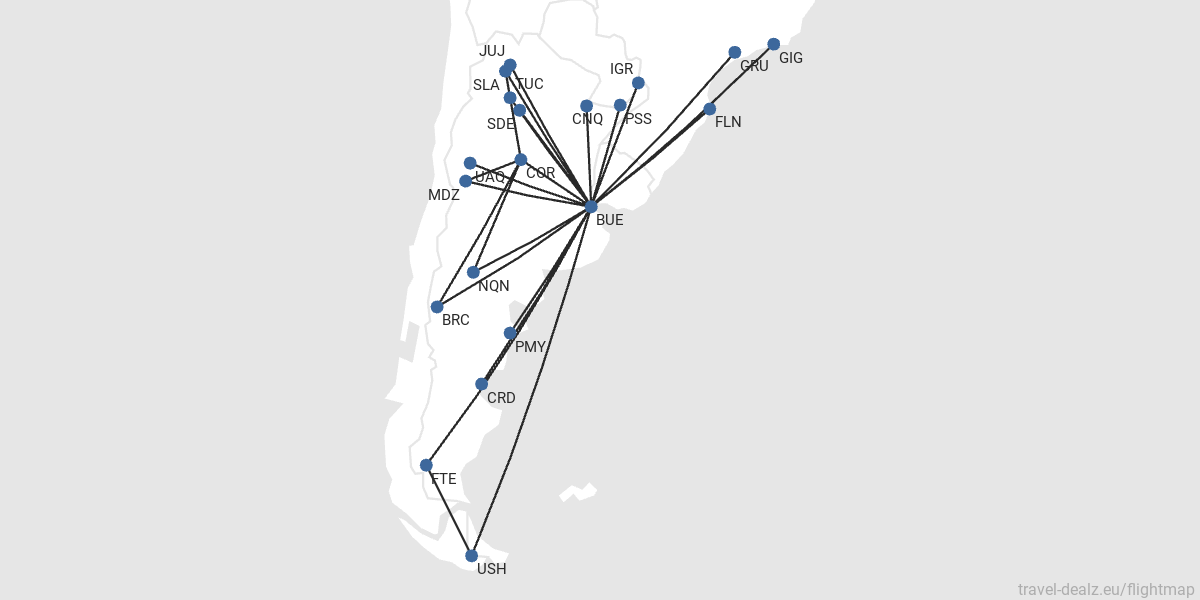Flybondi Expands Summer Operations: New Flights to Brazil and Across Argentina
Flybondi announced that it will increase its domestic and Brazil-bound flights ahead of the summer season following the addition of two Boeing 737-800 and two Airbus A320ceo aircraft to its fleet, increasing from 15 to 19 aircraft during this period.
Throughout November, the low-cost carrier added two Boeing 737-800 from AlbaStar and two A320ceo from Avion Express under the ACMI leasing model, meaning temporary lease with crew from the Spanish and Lithuanian airlines. The agreement is solely for the high season, running from December to March 2025.
Initially, these aircraft will replace three Boeing 737-800, two of which are undergoing a C-check at Mexicana MRO Services in Mexico City, while a third is located in Ezeiza. According to the company, all three are expected to rejoin the fleet before January, reaching 19 aircraft for the summer season.
After the summer season, Flybondi will return to operating 15 Boeing 737-800 with its own crew.
Flybondi’s new frequencies
The low-cost carrier will operate over 730 weekly flights across all its domestic and international routes.
- Buenos Aires – Posadas – Buenos Aires will increase from 5 to 14 weekly flights (2 daily flights).
- Buenos Aires – Neuquén – Buenos Aires will increase from 6 to 14 weekly flights (2 daily flights).
- Buenos Aires – Corrientes – Buenos Aires will increase from 5 to 11 weekly flights.
- Buenos Aires – Mendoza – Buenos Aires will increase from 18 to 38 weekly flights.
- Buenos Aires – Bariloche – Buenos Aires will increase from 21 to 42 weekly flights (6 daily flights).
- Buenos Aires – Puerto Iguazú – Buenos Aires will increase from 19 to 38 weekly flights.
- Buenos Aires – Tucumán – Buenos Aires will increase from 7 to 14 weekly flights (2 daily flights).
- Buenos Aires – San Juan – Buenos Aires will increase from 4 to 6 weekly flights.
- Buenos Aires – Salta – Buenos Aires will increase from 12 to 21 weekly flights (3 daily flights).
- Buenos Aires – Córdoba – Buenos Aires will increase from 19 to 31 weekly flights.
- Buenos Aires – Jujuy – Buenos Aires will increase from 9 to 14 weekly flights (2 daily flights).
- Buenos Aires – Ushuaia – Buenos Aires will increase from 9 to 14 weekly flights (2 daily flights).
- Buenos Aires – El Calafate – Buenos Aires will increase from 7 to 11 weekly flights.
- Buenos Aires – Comodoro Rivadavia – Buenos Aires will increase from 6 to 14 weekly flights (2 daily flights).
- Buenos Aires – Santiago del Estero – Buenos Aires will increase from 6 to 14 weekly flights (2 daily flights).

Regarding interprovincial routes, Flybondi will increase:
- Córdoba – Bariloche – Córdoba from 4 to 7 weekly flights (1 daily flight).
- Córdoba – Mendoza – Córdoba from 3 to 5 weekly flights.
- Córdoba – Neuquén – Córdoba from 4 to 5 weekly flights.
- El Calafate – Ushuaia – El Calafate from 3 to 6 weekly flights.
Additionally, for international destinations:
– The Florianópolis route will increase from 3 to 18 weekly flights, a 500% increase.
– Rio de Janeiro will grow from 14 to 21 weekly flights (3 daily flights).
– São Paulo will maintain daily flights.
Fewer cancellations?
Flybondi acknowledged the challenges recently faced due to cancellations and delays caused by fleet limitations. The company assures that the addition of temporary aircraft has reduced disruptions and that operations will return to normal with the re-entry of the three Boeing 737 undergoing maintenance and the introduction of the A320ceo aircraft.
According to the National Civil Aviation Administration (ANAC), these issues impacted Flybondi’s operational results. Between January and October 2024, the airline transported 2,802,193 passengers on domestic flights (-3.9% compared to 2023) and 349,624 on international routes (-5.9%). This decline aligns with a cooling domestic market, as pandemic-era internal tourism stimulus measures like PreViaje no longer exist. The low-cost carrier is optimistic that the projected frequency increases for 2025 will reverse this trend, surpassing last season’s levels, with over 139,000 passengers expected weekly.

/https://aviacionlinecdn.eleco.com.ar/media/2024/02/flybondi-lv-kdr-aeroparque.jpg)
Para comentar, debés estar registradoPor favor, iniciá sesión